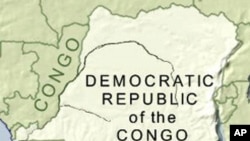It has been said that the war in the Democratic Republic of Congo has killed an estimated 5.4 million people, making it the most lethal since World War II.
The figure of 5.4 million deaths since 1988 was the finding of surveys done by the New York-based International Rescue Committee (IRC), a private relief agency.
Now a new review released Wednesday said the death toll in the Congo war could be reduced significantly if proper research methodology had been used.
Andrew Mack, director of the Human Security Report Project, a research institute at Simon Fraser University in British Columbia, Canada, said his group found two major problems with the IRC’s figure of 5.4 million deaths from the DRC war.
“The first one is we believe that the first two surveys that were carried out to cover the period from 1998 to 2001, those surveys weren’t carried out in appropriate scientific manner…the second problem is that in their final survey which were done much more appropriately is that they used a pre-war mortality rate which was much too low. And the lower you assume the pre-war mortality, the higher you’re going to find the excess overall war death toll,” he said
Mack said compounding the problem was that the pre-war mortality used was the average for Sub-Saharan Africa.
He said the DRC which languishes at the bottom of just every development indicator that exists cannot be used as an average for Sub-Saharan Africa.
Mack said his research group believes far less people must have died in the DRC war than the 5.4 million put forth by the IRC.
He said his group was reluctant to put any specific figure on the total number of deaths because it is so difficult to make an appropriate scientific measurement.
“When we used an alternative measure of the pre-war mortality rate, we found that the IRC estimates of their final three surveys, the figure dropped from 2.83 million to under 900,000. We did that simply to show that if you take another equally plausible but unprovable figure than you can finish up with a number that is way, way low,” Mack said.
The United Nations Security Council used the IRC’s death toll of 5.4 million to put together its 20,000 troops-strong peacekeeping mission for DRC, the largest such operation in the world.
Mack praised the IRC for helping to focus international attention on the war in the DRC, but he said his research group was concerned about the methodology used.
“We are far from being critical of the International Rescue Committee at all. Our sole point is that we do not believe that using these survey methods you can come up with reliable best estimates. And we think that there are alternative ways of showing the depth of a humanitarian crisis without resulting to these methodologies which are extremely controversial,” Mack said.
He said his group’s report was not about the war in the DRC. Instead Mack said the main focus of the review was to show that the death toll from wars has been declining.
“I should say that our report was not about the Congo. Our report was actually a good news story about how the human cost of war throughout the world, and especially in Africa has been going down. Fewer and fewer people are being killed in wars in Africa today than any time previously,” Mack said.
Richard Brennan, one of the co-authors of the IRC surveys that are under scrutiny, said while there were limitations to doing the study in war-ravaged Eastern Congo, he does not believe those limitations invalidate the findings.
“Certainly there were limitations in what we did because of insecurity in eastern Congo. So we had to make these assumptions and extrapolations which we believe were conservative. We acknowledge that there were some limitations but we do not believe and many other experts do not believe that they invalidate our findings,” Brennan said.
A New Study Finds Death Toll in Congo War too High
- By James Butty

Andrew Mack, director of the Human Security Report Project at Simon Fraser University in Canada says the IRC surveys that came up with 5.4 million deaths were not done using appropriate scientific methodologies








